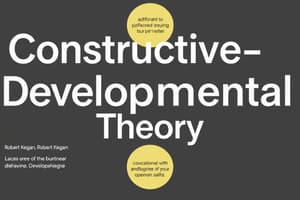Podcast
Questions and Answers
What are the three main purposes for Theories to develop?
What are the three main purposes for Theories to develop?
- Constructs and concepts are identified 2) Relationships proposed 3) Predictions are made to describe, explain, and prescribe practice and research
Define Theory Development.
Define Theory Development.
The processes and methods used to create, modify, refine theory.
Define Theory Construction.
Define Theory Construction.
Describes one of the final steps of theory development in which the components of the theory are organized and linkages specified.
What does theory development result in?
What does theory development result in?
What are the three main ways to categorize theory?
What are the three main ways to categorize theory?
What are the levels of abstraction in categorization of theories?
What are the levels of abstraction in categorization of theories?
Which theory is most abstract? Least abstract?
Which theory is most abstract? Least abstract?
Define Metatheory and give an example.
Define Metatheory and give an example.
Define Grand Theory and give an example.
Define Grand Theory and give an example.
Define Middle Range Theory and give an example.
Define Middle Range Theory and give an example.
Define Practice Theory and give an example.
Define Practice Theory and give an example.
How are the four levels in abstract categorization linked (cause and effect)?
How are the four levels in abstract categorization linked (cause and effect)?
What are the four levels of categorization based on purpose?
What are the four levels of categorization based on purpose?
What does descriptive theory accomplish? What do they lack?
What does descriptive theory accomplish? What do they lack?
What are the two types of descriptive theories? Describe them.
What are the two types of descriptive theories? Describe them.
What type of research techniques are used in descriptive theories?
What type of research techniques are used in descriptive theories?
What does explanatory theory describe?
What does explanatory theory describe?
What type of research techniques does explanatory theory use?
What type of research techniques does explanatory theory use?
What do predictive theories describe?
What do predictive theories describe?
Which research techniques does predictive theory use?
Which research techniques does predictive theory use?
Define prescriptive theories.
Define prescriptive theories.
What are the 3 components of prescriptive theory?
What are the 3 components of prescriptive theory?
Describe categorization based on discipline.
Describe categorization based on discipline.
What are the defined disciplines?
What are the defined disciplines?
Flashcards are hidden until you start studying
Study Notes
Theory Development Overview
- Theory development involves processes to create, modify, and refine theoretical frameworks.
- Primary purposes include identifying constructs, proposing relationships, and making predictions for practice and research.
Components of Theory
- Theory Construction: Involves organizing components and specifying linkages within a theory.
- Results in theoretical statements that can be empirically tested.
Theory Categorization
- Three main categorization methods:
- Scope or level of abstraction
- Purpose of theory
- Source or discipline
Levels of Abstraction
- Metatheory: Most abstract, debates broad issues regarding the nature of theories. Example: philosophy of nursing.
- Grand Theory: Abstract concepts that describe human experience, with no defined operations. Example: Roy's theory on nurse-client relationships.
- Middle Range Theory: Fewer concepts connecting grand theories to practice theories. Example: pain management strategies.
- Practice Theory: Derived from middle range theories, it specifies goals and interventions in practice. Example: cancer pain relief methods.
Linking Levels of Abstraction
- Each level contributes to understanding and directing nursing discipline:
- Metatheory informs grand theories.
- Grand theories guide middle range theories.
- Middle range theories shape practice theories.
- Practice theories test middle range theories in real-world settings.
Categorization by Purpose
- Four types of theories based on purpose:
- Descriptive Theories: Describe and name concepts but do not explain relationships.
- Explanatory Theories: Clarify how and why concepts relate and establish causal connections.
- Predictive Theories: Detail relationships between concepts and future outcomes through manipulation.
- Prescriptive Theories: Outline necessary activities to achieve goals and predict intervention consequences.
Research Techniques
- Descriptive Theories: Use techniques like concept analysis, surveys, and ethnography.
- Explanatory Theories: Rely on qualitative and quantitative data from observations and self-reports.
- Predictive Theories: Use experimental designs such as pretest-posttest and true experiments.
Prescriptive Theory Components
- Comprised of specified goals, explicit activities to achieve those goals, and a conceptual basis for the theory.
Discipline-Based Categorization
- Theories are categorized according to their disciplinary origins:
- Sociological sciences, behavioral sciences, biomedical sciences, management sciences, and learning theories.
- Shared theories may span across different disciplines.
Studying That Suits You
Use AI to generate personalized quizzes and flashcards to suit your learning preferences.




